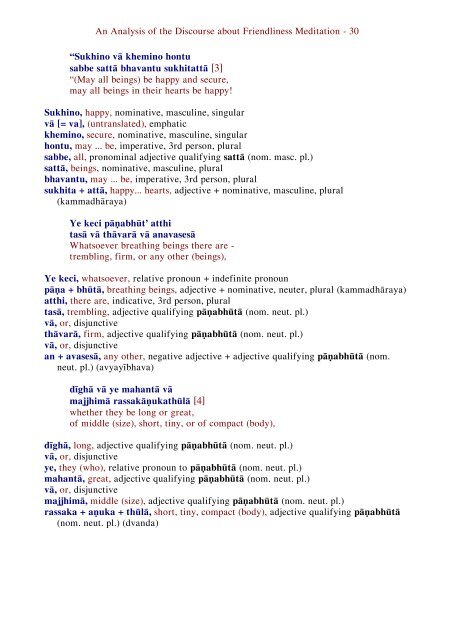Tisuttanirutti, A Grammatical Analysis of Three Discourses
A complete grammatical analysis of three of the most important discourses of the Pāli Canon (Maṅgala, Ratana and Mettā), showing relationship and meaning.
A complete grammatical analysis of three of the most important discourses of the Pāli Canon (Maṅgala, Ratana and Mettā), showing relationship and meaning.
Create successful ePaper yourself
Turn your PDF publications into a flip-book with our unique Google optimized e-Paper software.
An <strong>Analysis</strong> <strong>of</strong> the Discourse about Friendliness Meditation - 30<br />
“Sukhino vā khemino hontu<br />
sabbe sattā bhavantu sukhitattā [3]<br />
“(May all beings) be happy and secure,<br />
may all beings in their hearts be happy!<br />
Sukhino, happy, nominative, masculine, singular<br />
vā [= va], (untranslated), emphatic<br />
khemino, secure, nominative, masculine, singular<br />
hontu, may ... be, imperative, 3rd person, plural<br />
sabbe, all, pronominal adjective qualifying sattā (nom. masc. pl.)<br />
sattā, beings, nominative, masculine, plural<br />
bhavantu, may ... be, imperative, 3rd person, plural<br />
sukhita + attā, happy... hearts, adjective + nominative, masculine, plural<br />
(kammadhāraya)<br />
Ye keci pāṇabhūt’ atthi<br />
tasā vā thāvarā vā anavasesā<br />
Whatsoever breathing beings there are -<br />
trembling, firm, or any other (beings),<br />
Ye keci, whatsoever, relative pronoun + indefinite pronoun<br />
pāṇa + bhūtā, breathing beings, adjective + nominative, neuter, plural (kammadhāraya)<br />
atthi, there are, indicative, 3rd person, plural<br />
tasā, trembling, adjective qualifying pāṇabhūtā (nom. neut. pl.)<br />
vā, or, disjunctive<br />
thāvarā, firm, adjective qualifying pāṇabhūtā (nom. neut. pl.)<br />
vā, or, disjunctive<br />
an + avasesā, any other, negative adjective + adjective qualifying pāṇabhūtā (nom.<br />
neut. pl.) (avyayībhava)<br />
dīghā vā ye mahantā vā<br />
majjhimā rassakāṇukathūlā [4]<br />
whether they be long or great,<br />
<strong>of</strong> middle (size), short, tiny, or <strong>of</strong> compact (body),<br />
dīghā, long, adjective qualifying pāṇabhūtā (nom. neut. pl.)<br />
vā, or, disjunctive<br />
ye, they (who), relative pronoun to pāṇabhūtā (nom. neut. pl.)<br />
mahantā, great, adjective qualifying pāṇabhūtā (nom. neut. pl.)<br />
vā, or, disjunctive<br />
majjhimā, middle (size), adjective qualifying pāṇabhūtā (nom. neut. pl.)<br />
rassaka + aṇuka + thūlā, short, tiny, compact (body), adjective qualifying pāṇabhūtā<br />
(nom. neut. pl.) (dvanda)


















